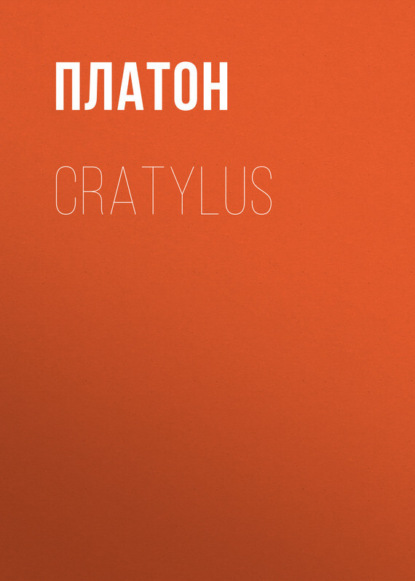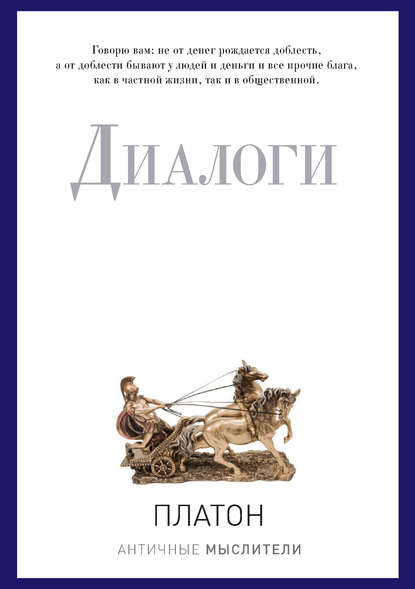 Полная версия
Полная версияПолная версия:
Платон Cratylus
- + Увеличить шрифт
- - Уменьшить шрифт

Plato
Cratylus
INTRODUCTION
The Cratylus has always been a source of perplexity to the student of Plato. While in fancy and humour, and perfection of style and metaphysical originality, this dialogue may be ranked with the best of the Platonic writings, there has been an uncertainty about the motive of the piece, which interpreters have hitherto not succeeded in dispelling. We need not suppose that Plato used words in order to conceal his thoughts, or that he would have been unintelligible to an educated contemporary. In the Phaedrus and Euthydemus we also find a difficulty in determining the precise aim of the author. Plato wrote satires in the form of dialogues, and his meaning, like that of other satirical writers, has often slept in the ear of posterity. Two causes may be assigned for this obscurity: 1st, the subtlety and allusiveness of this species of composition; 2nd, the difficulty of reproducing a state of life and literature which has passed away. A satire is unmeaning unless we can place ourselves back among the persons and thoughts of the age in which it was written. Had the treatise of Antisthenes upon words, or the speculations of Cratylus, or some other Heracleitean of the fourth century B.C., on the nature of language been preserved to us; or if we had lived at the time, and been 'rich enough to attend the fifty-drachma course of Prodicus,' we should have understood Plato better, and many points which are now attributed to the extravagance of Socrates' humour would have been found, like the allusions of Aristophanes in the Clouds, to have gone home to the sophists and grammarians of the day.
For the age was very busy with philological speculation; and many questions were beginning to be asked about language which were parallel to other questions about justice, virtue, knowledge, and were illustrated in a similar manner by the analogy of the arts. Was there a correctness in words, and were they given by nature or convention? In the presocratic philosophy mankind had been striving to attain an expression of their ideas, and now they were beginning to ask themselves whether the expression might not be distinguished from the idea? They were also seeking to distinguish the parts of speech and to enquire into the relation of subject and predicate. Grammar and logic were moving about somewhere in the depths of the human soul, but they were not yet awakened into consciousness and had not found names for themselves, or terms by which they might be expressed. Of these beginnings of the study of language we know little, and there necessarily arises an obscurity when the surroundings of such a work as the Cratylus are taken away. Moreover, in this, as in most of the dialogues of Plato, allowance has to be made for the character of Socrates. For the theory of language can only be propounded by him in a manner which is consistent with his own profession of ignorance. Hence his ridicule of the new school of etymology is interspersed with many declarations 'that he knows nothing,' 'that he has learned from Euthyphro,' and the like. Even the truest things which he says are depreciated by himself. He professes to be guessing, but the guesses of Plato are better than all the other theories of the ancients respecting language put together.
The dialogue hardly derives any light from Plato's other writings, and still less from Scholiasts and Neoplatonist writers. Socrates must be interpreted from himself, and on first reading we certainly have a difficulty in understanding his drift, or his relation to the two other interlocutors in the dialogue. Does he agree with Cratylus or with Hermogenes, and is he serious in those fanciful etymologies, extending over more than half the dialogue, which he seems so greatly to relish? Or is he serious in part only; and can we separate his jest from his earnest? – Sunt bona, sunt quaedum mediocria, sunt mala plura. Most of them are ridiculously bad, and yet among them are found, as if by accident, principles of philology which are unsurpassed in any ancient writer, and even in advance of any philologer of the last century. May we suppose that Plato, like Lucian, has been amusing his fancy by writing a comedy in the form of a prose dialogue? And what is the final result of the enquiry? Is Plato an upholder of the conventional theory of language, which he acknowledges to be imperfect? or does he mean to imply that a perfect language can only be based on his own theory of ideas? Or if this latter explanation is refuted by his silence, then in what relation does his account of language stand to the rest of his philosophy? Or may we be so bold as to deny the connexion between them? (For the allusion to the ideas at the end of the dialogue is merely intended to show that we must not put words in the place of things or realities, which is a thesis strongly insisted on by Plato in many other passages)…These are some of the first thoughts which arise in the mind of the reader of the Cratylus. And the consideration of them may form a convenient introduction to the general subject of the dialogue.
We must not expect all the parts of a dialogue of Plato to tend equally to some clearly-defined end. His idea of literary art is not the absolute proportion of the whole, such as we appear to find in a Greek temple or statue; nor should his works be tried by any such standard. They have often the beauty of poetry, but they have also the freedom of conversation. 'Words are more plastic than wax' (Rep.), and may be moulded into any form. He wanders on from one topic to another, careless of the unity of his work, not fearing any 'judge, or spectator, who may recall him to the point' (Theat.), 'whither the argument blows we follow' (Rep.). To have determined beforehand, as in a modern didactic treatise, the nature and limits of the subject, would have been fatal to the spirit of enquiry or discovery, which is the soul of the dialogue…These remarks are applicable to nearly all the works of Plato, but to the Cratylus and Phaedrus more than any others. See Phaedrus, Introduction.
There is another aspect under which some of the dialogues of Plato may be more truly viewed: – they are dramatic sketches of an argument. We have found that in the Lysis, Charmides, Laches, Protagoras, Meno, we arrived at no conclusion – the different sides of the argument were personified in the different speakers; but the victory was not distinctly attributed to any of them, nor the truth wholly the property of any. And in the Cratylus we have no reason to assume that Socrates is either wholly right or wholly wrong, or that Plato, though he evidently inclines to him, had any other aim than that of personifying, in the characters of Hermogenes, Socrates, and Cratylus, the three theories of language which are respectively maintained by them.
The two subordinate persons of the dialogue, Hermogenes and Cratylus, are at the opposite poles of the argument. But after a while the disciple of the Sophist and the follower of Heracleitus are found to be not so far removed from one another as at first sight appeared; and both show an inclination to accept the third view which Socrates interposes between them. First, Hermogenes, the poor brother of the rich Callias, expounds the doctrine that names are conventional; like the names of slaves, they may be given and altered at pleasure. This is one of those principles which, whether applied to society or language, explains everything and nothing. For in all things there is an element of convention; but the admission of this does not help us to understand the rational ground or basis in human nature on which the convention proceeds. Socrates first of all intimates to Hermogenes that his view of language is only a part of a sophistical whole, and ultimately tends to abolish the distinction between truth and falsehood. Hermogenes is very ready to throw aside the sophistical tenet, and listens with a sort of half admiration, half belief, to the speculations of Socrates.
Cratylus is of opinion that a name is either a true name or not a name at all. He is unable to conceive of degrees of imitation; a word is either the perfect expression of a thing, or a mere inarticulate sound (a fallacy which is still prevalent among theorizers about the origin of language). He is at once a philosopher and a sophist; for while wanting to rest language on an immutable basis, he would deny the possibility of falsehood. He is inclined to derive all truth from language, and in language he sees reflected the philosophy of Heracleitus. His views are not like those of Hermogenes, hastily taken up, but are said to be the result of mature consideration, although he is described as still a young man. With a tenacity characteristic of the Heracleitean philosophers, he clings to the doctrine of the flux. (Compare Theaet.) Of the real Cratylus we know nothing, except that he is recorded by Aristotle to have been the friend or teacher of Plato; nor have we any proof that he resembled the likeness of him in Plato any more than the Critias of Plato is like the real Critias, or the Euthyphro in this dialogue like the other Euthyphro, the diviner, in the dialogue which is called after him.
Between these two extremes, which have both of them a sophistical character, the view of Socrates is introduced, which is in a manner the union of the two. Language is conventional and also natural, and the true conventional-natural is the rational. It is a work not of chance, but of art; the dialectician is the artificer of words, and the legislator gives authority to them. They are the expressions or imitations in sound of things. In a sense, Cratylus is right in saying that things have by nature names; for nature is not opposed either to art or to law. But vocal imitation, like any other copy, may be imperfectly executed; and in this way an element of chance or convention enters in. There is much which is accidental or exceptional in language. Some words have had their original meaning so obscured, that they require to be helped out by convention. But still the true name is that which has a natural meaning. Thus nature, art, chance, all combine in the formation of language. And the three views respectively propounded by Hermogenes, Socrates, Cratylus, may be described as the conventional, the artificial or rational, and the natural. The view of Socrates is the meeting-point of the other two, just as conceptualism is the meeting-point of nominalism and realism.
We can hardly say that Plato was aware of the truth, that 'languages are not made, but grow.' But still, when he says that 'the legislator made language with the dialectician standing on his right hand,' we need not infer from this that he conceived words, like coins, to be issued from the mint of the State. The creator of laws and of social life is naturally regarded as the creator of language, according to Hellenic notions, and the philosopher is his natural advisor. We are not to suppose that the legislator is performing any extraordinary function; he is merely the Eponymus of the State, who prescribes rules for the dialectician and for all other artists. According to a truly Platonic mode of approaching the subject, language, like virtue in the Republic, is examined by the analogy of the arts. Words are works of art which may be equally made in different materials, and are well made when they have a meaning. Of the process which he thus describes, Plato had probably no very definite notion. But he means to express generally that language is the product of intelligence, and that languages belong to States and not to individuals.
A better conception of language could not have been formed in Plato's age, than that which he attributes to Socrates. Yet many persons have thought that the mind of Plato is more truly seen in the vague realism of Cratylus. This misconception has probably arisen from two causes: first, the desire to bring Plato's theory of language into accordance with the received doctrine of the Platonic ideas; secondly, the impression created by Socrates himself, that he is not in earnest, and is only indulging the fancy of the hour.
1. We shall have occasion to show more at length, in the Introduction to future dialogues, that the so-called Platonic ideas are only a semi-mythical form, in which he attempts to realize abstractions, and that they are replaced in his later writings by a rational theory of psychology. (See introductions to the Meno and the Sophist.) And in the Cratylus he gives a general account of the nature and origin of language, in which Adam Smith, Rousseau, and other writers of the last century, would have substantially agreed. At the end of the dialogue, he speaks as in the Symposium and Republic of absolute beauty and good; but he never supposed that they were capable of being embodied in words. Of the names of the ideas, he would have said, as he says of the names of the Gods, that we know nothing. Even the realism of Cratylus is not based upon the ideas of Plato, but upon the flux of Heracleitus. Here, as in the Sophist and Politicus, Plato expressly draws attention to the want of agreement in words and things. Hence we are led to infer, that the view of Socrates is not the less Plato's own, because not based upon the ideas; 2nd, that Plato's theory of language is not inconsistent with the rest of his philosophy.
2. We do not deny that Socrates is partly in jest and partly in earnest. He is discoursing in a high-flown vein, which may be compared to the 'dithyrambics of the Phaedrus.' They are mysteries of which he is speaking, and he professes a kind of ludicrous fear of his imaginary wisdom. When he is arguing out of Homer, about the names of Hector's son, or when he describes himself as inspired or maddened by Euthyphro, with whom he has been sitting from the early dawn (compare Phaedrus and Lysias; Phaedr.) and expresses his intention of yielding to the illusion to-day, and to-morrow he will go to a priest and be purified, we easily see that his words are not to be taken seriously. In this part of the dialogue his dread of committing impiety, the pretended derivation of his wisdom from another, the extravagance of some of his etymologies, and, in general, the manner in which the fun, fast and furious, vires acquirit eundo, remind us strongly of the Phaedrus. The jest is a long one, extending over more than half the dialogue. But then, we remember that the Euthydemus is a still longer jest, in which the irony is preserved to the very end. There he is parodying the ingenious follies of early logic; in the Cratylus he is ridiculing the fancies of a new school of sophists and grammarians. The fallacies of the Euthydemus are still retained at the end of our logic books; and the etymologies of the Cratylus have also found their way into later writers. Some of these are not much worse than the conjectures of Hemsterhuis, and other critics of the last century; but this does not prove that they are serious. For Plato is in advance of his age in his conception of language, as much as he is in his conception of mythology. (Compare Phaedrus.)
When the fervour of his etymological enthusiasm has abated, Socrates ends, as he has begun, with a rational explanation of language. Still he preserves his 'know nothing' disguise, and himself declares his first notions about names to be reckless and ridiculous. Having explained compound words by resolving them into their original elements, he now proceeds to analyse simple words into the letters of which they are composed. The Socrates who 'knows nothing,' here passes into the teacher, the dialectician, the arranger of species. There is nothing in this part of the dialogue which is either weak or extravagant. Plato is a supporter of the Onomatopoetic theory of language; that is to say, he supposes words to be formed by the imitation of ideas in sounds; he also recognises the effect of time, the influence of foreign languages, the desire of euphony, to be formative principles; and he admits a certain element of chance. But he gives no imitation in all this that he is preparing the way for the construction of an ideal language. Or that he has any Eleatic speculation to oppose to the Heracleiteanism of Cratylus.
The theory of language which is propounded in the Cratylus is in accordance with the later phase of the philosophy of Plato, and would have been regarded by him as in the main true. The dialogue is also a satire on the philological fancies of the day. Socrates in pursuit of his vocation as a detector of false knowledge, lights by accident on the truth. He is guessing, he is dreaming; he has heard, as he says in the Phaedrus, from another: no one is more surprised than himself at his own discoveries. And yet some of his best remarks, as for example his view of the derivation of Greek words from other languages, or of the permutations of letters, or again, his observation that in speaking of the Gods we are only speaking of our names of them, occur among these flights of humour.
We can imagine a character having a profound insight into the nature of men and things, and yet hardly dwelling upon them seriously; blending inextricably sense and nonsense; sometimes enveloping in a blaze of jests the most serious matters, and then again allowing the truth to peer through; enjoying the flow of his own humour, and puzzling mankind by an ironical exaggeration of their absurdities. Such were Aristophanes and Rabelais; such, in a different style, were Sterne, Jean Paul, Hamann, – writers who sometimes become unintelligible through the extravagance of their fancies. Such is the character which Plato intends to depict in some of his dialogues as the Silenus Socrates; and through this medium we have to receive our theory of language.
There remains a difficulty which seems to demand a more exact answer: In what relation does the satirical or etymological portion of the dialogue stand to the serious? Granting all that can be said about the provoking irony of Socrates, about the parody of Euthyphro, or Prodicus, or Antisthenes, how does the long catalogue of etymologies furnish any answer to the question of Hermogenes, which is evidently the main thesis of the dialogue: What is the truth, or correctness, or principle of names?
After illustrating the nature of correctness by the analogy of the arts, and then, as in the Republic, ironically appealing to the authority of the Homeric poems, Socrates shows that the truth or correctness of names can only be ascertained by an appeal to etymology. The truth of names is to be found in the analysis of their elements. But why does he admit etymologies which are absurd, based on Heracleitean fancies, fourfold interpretations of words, impossible unions and separations of syllables and letters?
1. The answer to this difficulty has been already anticipated in part: Socrates is not a dogmatic teacher, and therefore he puts on this wild and fanciful disguise, in order that the truth may be permitted to appear: 2. as Benfey remarks, an erroneous example may illustrate a principle of language as well as a true one: 3. many of these etymologies, as, for example, that of dikaion, are indicated, by the manner in which Socrates speaks of them, to have been current in his own age: 4. the philosophy of language had not made such progress as would have justified Plato in propounding real derivations. Like his master Socrates, he saw through the hollowness of the incipient sciences of the day, and tries to move in a circle apart from them, laying down the conditions under which they are to be pursued, but, as in the Timaeus, cautious and tentative, when he is speaking of actual phenomena. To have made etymologies seriously, would have seemed to him like the interpretation of the myths in the Phaedrus, the task 'of a not very fortunate individual, who had a great deal of time on his hands.' The irony of Socrates places him above and beyond the errors of his contemporaries.
The Cratylus is full of humour and satirical touches: the inspiration which comes from Euthyphro, and his prancing steeds, the light admixture of quotations from Homer, and the spurious dialectic which is applied to them; the jest about the fifty-drachma course of Prodicus, which is declared on the best authority, viz. his own, to be a complete education in grammar and rhetoric; the double explanation of the name Hermogenes, either as 'not being in luck,' or 'being no speaker;' the dearly-bought wisdom of Callias, the Lacedaemonian whose name was 'Rush,' and, above all, the pleasure which Socrates expresses in his own dangerous discoveries, which 'to-morrow he will purge away,' are truly humorous. While delivering a lecture on the philosophy of language, Socrates is also satirizing the endless fertility of the human mind in spinning arguments out of nothing, and employing the most trifling and fanciful analogies in support of a theory. Etymology in ancient as in modern times was a favourite recreation; and Socrates makes merry at the expense of the etymologists. The simplicity of Hermogenes, who is ready to believe anything that he is told, heightens the effect. Socrates in his genial and ironical mood hits right and left at his adversaries: Ouranos is so called apo tou oran ta ano, which, as some philosophers say, is the way to have a pure mind; the sophists are by a fanciful explanation converted into heroes; 'the givers of names were like some philosophers who fancy that the earth goes round because their heads are always going round.' There is a great deal of 'mischief' lurking in the following: 'I found myself in greater perplexity about justice than I was before I began to learn;' 'The rho in katoptron must be the addition of some one who cares nothing about truth, but thinks only of putting the mouth into shape;' 'Tales and falsehoods have generally to do with the Tragic and goatish life, and tragedy is the place of them.' Several philosophers and sophists are mentioned by name: first, Protagoras and Euthydemus are assailed; then the interpreters of Homer, oi palaioi Omerikoi (compare Arist. Met.) and the Orphic poets are alluded to by the way; then he discovers a hive of wisdom in the philosophy of Heracleitus; – the doctrine of the flux is contained in the word ousia (= osia the pushing principle), an anticipation of Anaxagoras is found in psuche and selene. Again, he ridicules the arbitrary methods of pulling out and putting in letters which were in vogue among the philologers of his time; or slightly scoffs at contemporary religious beliefs. Lastly, he is impatient of hearing from the half-converted Cratylus the doctrine that falsehood can neither be spoken, nor uttered, nor addressed; a piece of sophistry attributed to Gorgias, which reappears in the Sophist. And he proceeds to demolish, with no less delight than he had set up, the Heracleitean theory of language.
In the latter part of the dialogue Socrates becomes more serious, though he does not lay aside but rather aggravates his banter of the Heracleiteans, whom here, as in the Theaetetus, he delights to ridicule. What was the origin of this enmity we can hardly determine: – was it due to the natural dislike which may be supposed to exist between the 'patrons of the flux' and the 'friends of the ideas' (Soph.)? or is it to be attributed to the indignation which Plato felt at having wasted his time upon 'Cratylus and the doctrines of Heracleitus' in the days of his youth? Socrates, touching on some of the characteristic difficulties of early Greek philosophy, endeavours to show Cratylus that imitation may be partial or imperfect, that a knowledge of things is higher than a knowledge of names, and that there can be no knowledge if all things are in a state of transition. But Cratylus, who does not easily apprehend the argument from common sense, remains unconvinced, and on the whole inclines to his former opinion. Some profound philosophical remarks are scattered up and down, admitting of an application not only to language but to knowledge generally; such as the assertion that 'consistency is no test of truth:' or again, 'If we are over-precise about words, truth will say "too late" to us as to the belated traveller in Aegina.'
The place of the dialogue in the series cannot be determined with certainty. The style and subject, and the treatment of the character of Socrates, have a close resemblance to the earlier dialogues, especially to the Phaedrus and Euthydemus. The manner in which the ideas are spoken of at the end of the dialogue, also indicates a comparatively early date. The imaginative element is still in full vigour; the Socrates of the Cratylus is the Socrates of the Apology and Symposium, not yet Platonized; and he describes, as in the Theaetetus, the philosophy of Heracleitus by 'unsavoury' similes – he cannot believe that the world is like 'a leaky vessel,' or 'a man who has a running at the nose'; he attributes the flux of the world to the swimming in some folks' heads. On the other hand, the relation of thought to language is omitted here, but is treated of in the Sophist. These grounds are not sufficient to enable us to arrive at a precise conclusion. But we shall not be far wrong in placing the Cratylus about the middle, or at any rate in the first half, of the series.





